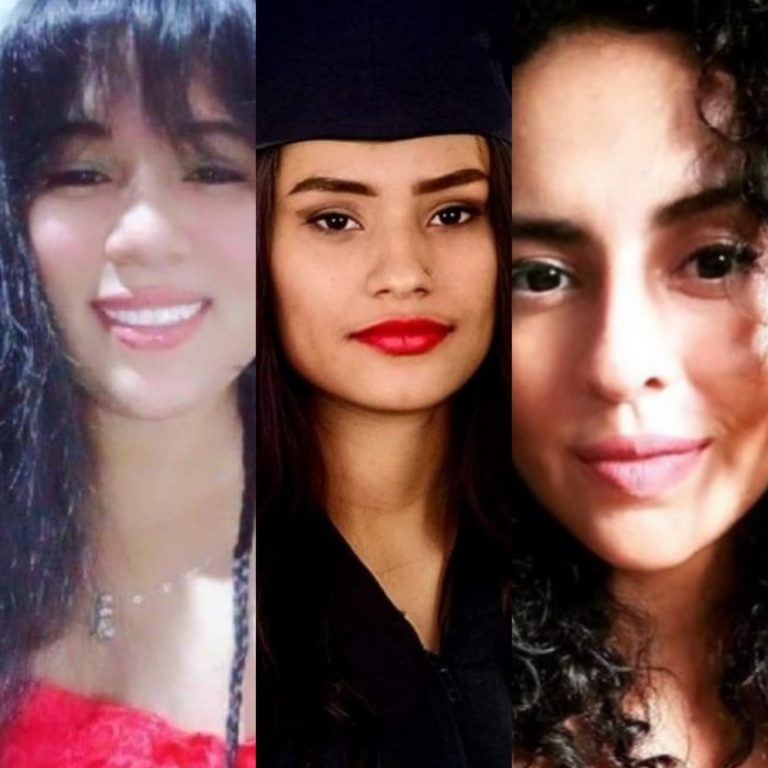31 de octubre 2023

Children of Exile: The Births “Sowing Hope” in the Camp of Nicaraguan Farmers

PUBLICIDAD 1M
PUBLICIDAD 4D
PUBLICIDAD 5D
The women have also been accused of “spreading fake news” and “undermining national integrity.” The sham trial is set for November 7

The Ortega justice system fabricated a third charge against the three university leaders arrested in August after the closing and confiscation of the Central American University (UCA). Now they are also charged with “possession of marijuana,” in addition to the crimes of “spreading fake news” and “undermining national integrity,” confirmed a source who had access to the expanded indictment. The third offense was reported on Friday, October 27, and the trial is scheduled for Tuesday, November 7.
“Now the Prosecutor’s Office says that they were found with packages of marijuana,” says the source, who assures that the alleged evidence that the Public Prosecutor’s Office has against the young women is unknown.
The student leaders, Adela Espinoza Tercero, a graduate of social communication at UCA; Gabriela Morales, from the defunct Juan Pablo II University; and Mayela Campos Silva, a third-year industrial engineering student at the National University of Engineering (UNI), were arrested separately, without the Police explaining their detention. They were taken to the District III Police Station in Managua and, in less than a week, were moved to the women’s prison, La Esperanza, where they remain in isolation.
The three young women were included in a single court case, in which the Prosecutor’s Office argued that they were detained together when this was not the case, the source refuted. Espinoza and Morales were abducted on Saturday, August 19, from their respective homes, and Campos was arrested on Monday, August 21.
A criminal lawyer, who agreed to speak to Confidencial under anonymity, explained that the Prosecution could broaden the charge against the political prisoners relying on article 259 of the Criminal Procedural Code, which states the possibility of modifying the indictment before the trial begins.
“The prosecutor may broaden the indictment by including a new fact that modifies the legal classification or the sentence or is related to it,” the article states. However, it also establishes that “the accused will be given a reasonable period of time, at the judge’s discretion, to prepare their defense.”
The problem, the criminal lawyer points out, is that the Ortega justice system violates the right to defense of political prisoners. The situation has worsened after the banishment of 222 political prisoners in February 2023, as public defenders are imposed on those detained after that date, and the court files are entirely restricted.
This is not the first time that the Ortega regime accuses political prisoners of drug possession or drug trafficking, says the criminal lawyer. Since the outbreak of the April Rebellion in 2018, the Ortega justice system has fabricated different crimes to jail and prosecute hundreds of prisoners of conscience.
The main charges in 2018 against political prisoners were for terrorism, and in 2019 were for ordinary crimes, such as robbery, illegal possession of weapons, and above all, drug trafficking and possession. Most of the 35 political prisoners that the regime did not release after the banishment of 222 in February are serving sentences for ordinary crimes, including drug possession.
That is the case of Kevin Emilio Castillo Prado, who was arrested twice. In 2019, he was prosecuted for allegedly stealing a bicycle and sentenced to one year in prison. He was released from prison in 2020, but on September 3, 2021, he was arrested and charged for alleged drug possession.
Political prisoner Misael de Jesus Escorcia Rugama, a native of Sebaco, Matagalpa, was recaptured on May 8, 2021. He was charged for the alleged crime of drug trafficking after being found with four pounds of marijuana, according to a police press release.
The same occurred with Edder Munoz Centeno, a native of Masaya, and arrested for the third time on November 23, 2021. He was sentenced to nine years for alleged drug trafficking and illegal possession of weapons, charges rejected by his relatives who claim it is due to political motives for his opposition activism.
The Ortega dictatorship currently holds more than 130 political prisoners in Nicaragua, among which are those in prison and those who remain under “house arrest” or have their movements restricted to the city.
Twenty-six years old, Adela Espinoza graduated in social communication at the UCA. She is a feminist activist and mother of two minors. In an interview that her mother, Flor Tercero, gave to 100% Noticias, she shared that Adela actively participated in the 2018 protests and later joined women’s organizations. “She is a feminist,” her mother emphasized.
Gabriela Morales is a social worker who graduated from Pablo II University, an academic institution also confiscated by the regime of Daniel Ortega and Rosario Murillo. She actively participated in the 2018 protests, and it is assumed that she was arrested for some publications on social networks.
Mayela Campos was also involved in the civic struggle, and it is believed that she was arrested for a video shared on social networks.
This article was originally published in Spanish in Confidencial and translated by Havana Times.
PUBLICIDAD 3M
Confidencial es un diario digital nicaragüense, de formato multimedia, fundado por Carlos F. Chamorro en junio de 1996. Inició como un semanario impreso y hoy es un medio de referencia regional con información, análisis, entrevistas, perfiles, reportajes e investigaciones sobre Nicaragua, informando desde el exilio por la persecución política de la dictadura de Daniel Ortega y Rosario Murillo.
PUBLICIDAD 3D